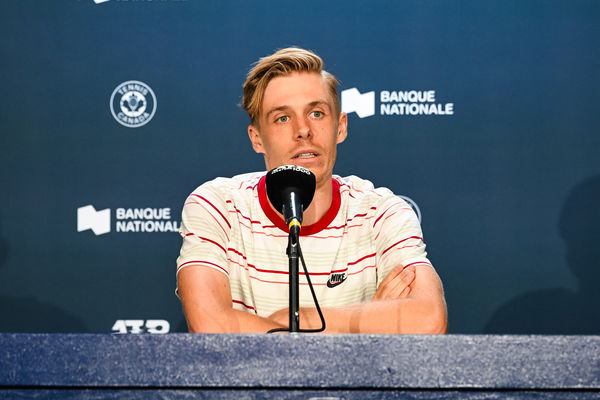
via Imago
Aug 5, 2024; Montreal, Quebec, Canada; Denis Shapovalov (CAN) answers questions during a press conference at IGA Stadium. Mandatory Credit: David Kirouac-USA TODAY Sports

via Imago
Aug 5, 2024; Montreal, Quebec, Canada; Denis Shapovalov (CAN) answers questions during a press conference at IGA Stadium. Mandatory Credit: David Kirouac-USA TODAY Sports
“Probably they are going to kill us in some way,” said Carlos Alcaraz, as he highlighted his problems because of the packed scheduling in the tennis calendar. Since this statement came from one of the top players in the world, it was only natural that the other members of the tennis community were going to react. Social media, the haven for players to discuss their thoughts, is flooded with views on how the current scheduling helps the lower-ranked players make their living. Amid all the debate, Denis Shapovalov has also shared his insightful comments.
Shapovalov recently made his entry into a heated debate about the financial difficulties faced by lower-ranked tennis players and the exhausting demands of the tennis calendar. The Canadian pro suggested that many players outside the top 20 struggle to earn enough during the regular season as only the four Grand Slam tournaments offer decent prize money. This forces them to play exhibition matches during their off weeks to make ends meet. “If players would make decent money during the season, they wouldn’t feel the need to play exhos in off weeks,” Shapovalov posted on X. He highlighted that the financial pressure on players out of the top tier leaves them with limited options to let their careers breathe.
Tennis journalist Myles David shared a counterpoint by using the example of Laslo Djere, who is ranked outside the top 100. “Just out of curiosity, I checked YTD prize money accrual for a player who’s outside of the top 100, Laslo Djere actually… he’s made $575,761,000. Is that not decent money?” David wrote. Shapovalov clarified that much of the earnings go to taxes, coaching fees, and travel expenses as a response to that. “Tennis isn’t like other sports where you keep the money you make. There are a lot of costs as a tennis player,” he reverted.
ADVERTISEMENT
Article continues below this ad
Yes but take out taxes, percentages, salaries and expenses we pay. Tennis isn’t like other sports where you keep the money you make. There are a lot of costs as a tennis player. Not saying we don’t make money, just that we make much more money playing exhos. https://t.co/T6p1qeKVTj
— Denis Shapovalov (@denis_shapo) September 27, 2024
This debate started after the Wimbledon champion Carlos Alcaraz expressed frustration over the packed tennis schedule. After playing in 14 tournaments this year, the Spaniard said the demanding calendar makes it tough for players to balance their professional and personal lives. “Right now, a lot of good players are going to miss a lot of tournaments because of injury,” he said after his victory at the Laver Cup in Berlin.
ADVERTISEMENT
Article continues below this ad
However, it wasn’t just Shapovalov’s intrigue that was triggered by these comments. US Open champion and Alcaraz’s biggest rival Jannik Sinner also came forward to drop his views.
Jannik Sinner’s advice on the troubles of tight scheduling before Denis Shapovalov stepped in
While Carlos Alcaraz openly criticized the demanding tennis calendar, his rival Jannik Sinner came forward with a different opinion. The Italian star said that players must take personal responsibility for managing their schedules. Sinner mentioned that the season is long and has many tournaments but noted that players still have control over what events they participate in. “We players, we can still choose what to play and what not to play,” he said in a press conference at the China Open.
ADVERTISEMENT
Article continues below this ad
What’s your perspective on:
Is the current tennis schedule pushing players like Shapovalov to their breaking point? What do you think?
Have an interesting take?
Sinner also pointed out that despite certain events being mandatory, players can still design their schedules based on their physical condition and training needs. He supported the statement with his own experience by explaining how he skipped tournaments to focus on practice and recovery. “For example, last year and also this year, I didn’t play some tournaments because I wanted to practice. There are some choices behind this,” Sinner noted. His comments reflect a belief that careful planning can help avoid burnout.
Sinner’s viewpoint was slightly different from that of Alcaraz who voiced concerns about the intensity of the modern tennis calendar. Despite the differences in the thoughts of players, Sinner’s message highlighted the importance of players taking charge of their own workload and decisions.
Have something to say?
Let the world know your perspective.
ADVERTISEMENT
ADVERTISEMENT
ADVERTISEMENT

Debate
Is the current tennis schedule pushing players like Shapovalov to their breaking point? What do you think?